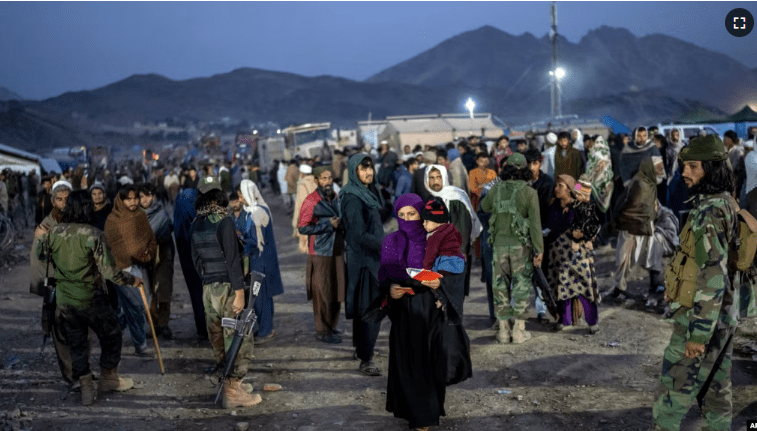
ISLAMABAD —
Pakistan’s decision on Friday to extend the term of a key document that allows Afghans to live in the country legally has created some breathing room for refugees who fear they would be sent back to Afghanistan.
Prime Minister Shehbaz Sharif’s Cabinet Friday approved extending proof of registration cards for Afghan refugees that expired April 1 to June 30, according to an official statement.
The document allows Afghan refugees to have access to health, educational, and banking facilities.
United Nations High Commission for Refugees (UNHCR) welcomed Pakistan’s decision but said refugees should be given a longer extension to lessen the uncertainty they face.
“We welcome the extension, but also hope that after June, they [POR cards] can be extended for longer than three months to give more certainty to Afghan refugees,” said Philippa Candler, the refugee agency’s Pakistan representative in written comments to VOA.
According to the statement issued by the Ministry of Information, expulsion of documented refugees will come at later.
“The POR cardholders will be sent back in the third stage of the program to expel foreigners residing illegally in Pakistan,” the statement said.
FILE – Afghan refugees wait to register in a camp near the Torkham Pakistan-Afghanistan border in Torkham, Afghanistan, Nov. 4, 2023.
FILE – Afghan refugees wait to register in a camp near the Torkham Pakistan-Afghanistan border in Torkham, Afghanistan, Nov. 4, 2023.
Faced with rising terror attacks, Pakistan launched a drive in October 2023 to evict foreign nationals residing illegally in the country.
The decision primarily impacted Afghans who arrived in Pakistan over the last four decades, seeking refuge from war and poverty at home.
In the first phase of the on-going drive, more than half a million Afghans have left Pakistan since last fall, according to data compiled by the UNHCR and the International Organization for Migration (IOM).
According to the UNHCR, Pakistan is now home to around 3.1 million Afghans. Data shows 1.35 million are registered or POR cardholders. More than 800,000 have Afghan citizenship cards while the remaining are unregistered.
In the second phase, Pakistan plans to repatriate Afghan citizenship card (ACC) holders. At a recent news briefing, the spokesperson for Pakistan’s Ministry of Foreign Affairs clarified the second phase of the expulsion program had not yet begun.
“I would like to underline that Pakistani authorities are considering all aspects of the Illegal Foreigners Repatriation Plan and at this point there are no plans to repatriate the ACC holders,” Mumtaz Zahra Baloch said. “When such a decision is taken the relevant authorities will make an announcement,” she added, addressing media reports suggesting the phase had been launched.
Afghan Taliban as well as international and Pakistani human rights activists have condemned Islamabad’s plan to send Afghans back.
Rights activists worry women and girls will live under severe repression as the Afghan Taliban have forbidden women from most jobs and public spaces, and banned education for girls beyond the sixth grade.
“Pakistan’s ‘Illegal Foreigners’ Repatriation Plan’ is in violation of refugee and international human rights law,” Amnesty International said in a statement earlier this month.
A recent survey by Save the Children revealed nearly 65% of the 250,000 children who returned to Afghanistan from Pakistan are not in school anymore, largely because of a lack of documents needed to enroll.
FILE – Displaced Afghan children warm themselves at a fire in a camp near the Torkham Pakistan-Afghanistan border crossing in Torkham, Afghanistan, Nov. 4, 2023, following their repatriation from Pakistan.
SEE ALSO:
Afghan children returning from Pakistan face grim reality, survey finds
Pakistan is not a signatory to the 1951 U.N. convention protecting refugee rights. But the country has run registration drives in the past with help from the UNHCR to give Afghans documentation that gave them long-term protection.
Since the Taliban took control of Afghanistan after the chaotic withdrawal of U.S. troops in August 2021, Pakistan has seen a spike in terror attacks primarily by the Tehreek-e-Taliban Pakistan (TTP), an ideological offshoot of the Afghan Taliban. TTP and groups affiliated with it have killed thousands of Pakistani security personnel in attacks concentrated in the provinces along the border between Afghanistan and Pakistan.
Pakistani military and the government accuse Afghan Taliban of providing a haven to anti-state terrorists, a charge the de facto rulers in Kabul deny. Pakistani authorities claim Afghan nationals have been involved in several deadly attacks on Pakistani security personnel.








